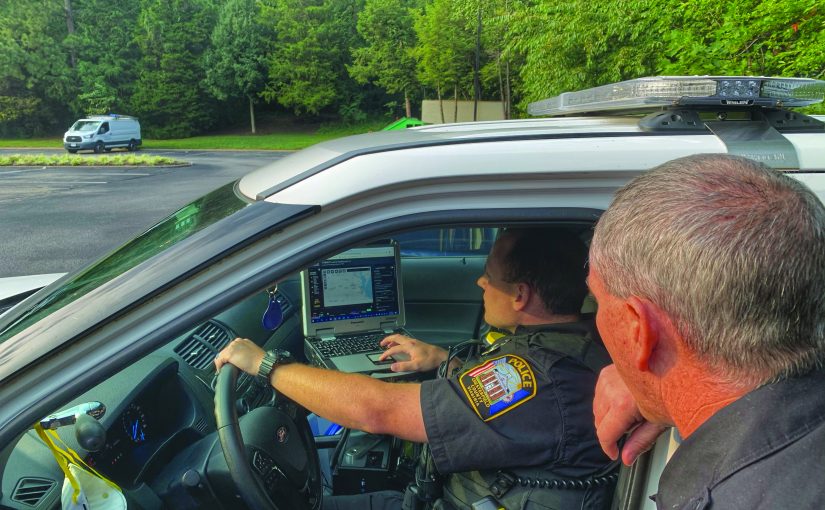Even as the private market has rebounded from what some call a post-COVID employment slide, public safety employment recruitment and retention continues to decline.
According to the Police Executive Research Forum’s 2021 Workforce Survey, “hiring within medium and large-sized police departments had decreased by 29 percent and 36 percent, respectively, over the prior year.”1 The Marshall Project cites that “in Tulsa, Oklahoma, a city of 411,000 with a violent crime rate twice the national average, police officials are struggling to fill 160 vacant officer jobs.”2
Law enforcement agencies across the United States are getting creative with recruitment strategies—offering signing bonuses, competitive compensation packages, and lateral transfers. This trend reinforces the need for agencies to hyperfocus on setting the stage for officers’ long-term success. This focus begins with programs that place greater emphasis on the essentials of officer training, development, and retention.3
The Increasing Importance of Officer Retention
In today’s evolving work environment, agencies are faced with transforming the way they view and manage officer recruitment and retention. Agencies must put practices in place to become more marketable to candidates and strengthen morale to create long-term satisfaction for established officers.
Montgomery County, Maryland, is one of the latest agencies to show the increasing importance of officer retention. A recent report laid out the operational impacts due to understaffing, including longer call response times and “field unit time to the incident.” This is due to an increasing number of resignations and retirements, with an increase of 64 percent in 2022. And it’s only set to get worse: “more than 30 percent of sworn officers are currently eligible for some type of retirement.”4
As agencies embark on strategies to address recruitment and retention issues, it is important to recognize the critical role of positive workplace culture. In 2022, Revelio Labs conducted extensive research into the rising rates of turnover across several industries in the private sector.5 Overall, toxic work culture was ranked as the number one reason employees left their jobs. It could be argued that this is even more true in public safety where officers are driven by a higher purpose. Officers don’t enter the law enforcement profession looking for fame or fortune. Instead, they view their careers as a calling to fulfill the mission to protect and serve. They want to know they are making a positive impact. It is then the agency’s responsibility to build a positive culture that supports and mentors officers in that pursuit.
Maximize the Effectiveness of Field Training Officer Programs
Field training officer (FTO) programs are a key piece of the officer retention puzzle. A robust FTO program not only equips officers with the right combination of knowledge, skills, and mentorship to succeed, but it also sets the stage for the rest of an officer’s career.
Agencies can build a positive work culture from day one by reinvigorating and refining their FTO programs with modern practices that take the process from a mandatory checklist item to an effective mentoring and development tool. As a result, new officers are not only prepared to do the job with excellence; they also know how they fit into the bigger picture of the agency’s values and culture.
Recognize Field Training Officers as the First Frontier
Police chiefs are ultimately responsible for defining the purpose, process, strategic outlook, and initiatives for an agency; however, these serve only as the foundations for an agency’s culture. It is important to recognize that formal leadership cannot shape the culture of an agency on its own.
That’s where FTOs come into play.
FTOs are more than a resource for new officers; they are the first line for mentorship. Their responsibility to train and mentor new officers in complex policies and procedures is a crucial component to setting the tone for a positive experience.6 FTOs play a key role in shaping the next generation of officers and, most likely, the next generation of leaders.
Consider the Full Picture
 FTOs invest a significant amount of time, energy, and patience into guiding new officers through hands-on learning of what it takes to do the job. FTOs give new officers the first authentic glimpse of what it’s like to be a police officer. If FTOs are bogged down by paperwork, manual processes, and an attitude of “just checking it off the list,” they could easily become demoralized or adopt the same passive attitude about police work.
FTOs invest a significant amount of time, energy, and patience into guiding new officers through hands-on learning of what it takes to do the job. FTOs give new officers the first authentic glimpse of what it’s like to be a police officer. If FTOs are bogged down by paperwork, manual processes, and an attitude of “just checking it off the list,” they could easily become demoralized or adopt the same passive attitude about police work.
This is why FTOs are so critical to retention and the development of a positive culture within agencies. But the job is not an easy one, and many FTOs can start to experience burnout when they don’t have the proper support and development of their own.
When officers become FTOs, they take on the additional role of instructor, coach, documenter, and evaluator, all while executing the numerous responsibilities involved with day-to-day patrol work. What should have been an inspiring role for the FTOs can quickly become an extra burden, with piled-on responsibilities and little ability to actually make the impact they imagined.
Leadership must recognize the crucial role these leaders play in their agency and provide adequate, consistent support through meaningful and modern training resources.
Centralize and Digitize Training Management
One of the most cumbersome and draining responsibilities for an FTO isn’t the training itself. Rather, it’s the training documentation. While reports are inherent to law enforcement work, complex and detailed training documentation on paper can take an excessive amount of time and effort to complete. Instead of focusing on the development and mentorship of a new officer, an FTO may be forced to spend time searching through hard copy training manuals and cross-referencing paper daily observation reports to properly document every activity.
Agencies should manage their training documentation in one central, digital location. This will allow every FTO to quickly reference the most updated and accurate policies and procedures while documenting training activities in the moment. More efficient processes will enable them to focus on developing new officers with excellence.
Conduct Evaluations—with Analysis
Through changes in policies, standards, and expectations, an FTO’s workload remains consistently heavy. If trainers aren’t given effective feedback on how to improve, they can get stuck practicing outdated methods that don’t serve them, trainees, or the agency as a whole.
It is crucial that agency leadership recognizes FTOs’ contributions and give them the information they need to improve and grow. Evaluate what is working, what is not, and what changes need to be made for more effective training of new officers.
This simple ability to evaluate and provide concrete feedback to trainers will further engage FTOs in their own career development while instilling a culture of excellence in the agency with focused, continual improvements.
Provide Internal and External Transparency
Transparency provides clarity and understanding, so it’s important to look at how an agency can provide internal and external transparency for FTOs.
From an internal standpoint, agencies should give FTOs the opportunity to know the history of the recruit they are receiving. This gives them the ability to understand the recruit’s career path ahead of time, which can lead to a more trusting relationship from the start.
From an external standpoint, agencies should track data to validate decisions made throughout the training process. Documentation is crucial for any agency; however, it becomes even more important during the training process. By keeping historic records, agencies can validate training, prove compliance, and ensure the safety of their officers in the long term.
Take a Simplified, Data-Driven Approach
According to Police Chief Maris Herold of Boulder, Colorado, Police Department and crime scientist Dr. Tamara D. Herold,
data-driven policing improves strategic and tactical decision-making by enhancing agency capacity to detect problems and develop efficient and effective solutions to inform deployment and maximize the impact of limited departmental resources.7
Leveraging data, particularly when it comes to maximizing departmental resources, is also key when evaluating and improving the effectiveness of an agency’s FTO program. Traditionally, many FTO programs have been treated as an accountability measure rather than the powerful mentoring and developmental tool that they are. As a result, many programs have been relegated to time-consuming, paper-based manual processes rather than software tools. However, as resignations and retirements continue to skyrocket, agencies must look at investing more significantly in modern training practices that will ultimately breed long-term officer retention and success.8

In addition to enhancing agencywide efficiency by lifting the burden of cumbersome documentation and reporting processes, technology can also gather critical data about the success of trainers and trainees in the FTO program. By leveraging these data, agencies can objectively measure performance and identify gaps in the program. This first step—awareness—can inform decisions and raise the plateau of expectations across an agency.
Data also drive continuous improvement that can be supported throughout all phases of onboarding, training, and ongoing officer development. When looking to provide a disciplinary action, FTOs are equipped with a full picture of a trainee’s performance, rather than a single action. They can point to data that establish a story and demonstrate to an officer what went wrong and where growth is needed. This creates an entirely new feedback loop for officers, offering both positive reinforcement and constructive criticism, which can be revisited on a regular basis.
Bastrop County, Texas, Police Department is just one example of an agency that has taken a data-driven approach to its FTO program by using a solution by PowerDMS by NEOGOV. As administrative sergeant, Zachary Carter, put it, “because we have better trained staff, we are losing less officers because they are seeing a positive change in the division.”9
Moving Forward with a Holistic Viewpoint
It is quite likely that every officer can look back and remember who mentored them during their time in the FTO program. The impact that an FTO has on an agency’s culture, in addition to the officers they develop, is invaluable.
As agencies look to improve officer recruitment, retention, and long-term success, a cultural shift in how FTO programs are viewed is imperative. Rather than viewing an FTO program as a checklist for compliance, agencies must look through a holistic lens and consider how their program can set the stage for the agency of tomorrow. d
Notes:
1The Police Executive Research Forum, Survey on Policing Workforce Trends, June 2021.
2Daphne Duret and Weihua Li, “It’s Not Just a Police Problem, Americans Are Opting Out of Government Jobs,” The Marshall Project, January 21, 2023.
3Joe Vince, “Creative Recruit Pursuits: How PDs Are Attracting Officers,” Officer Magazine, May 17, 2022.
4Steve Bohnel, “County Data Shows Ongoing Major Challenges with Police Staffing, Recruitment,” MoCo360, February 10, 2023.
5Donald Sull, Charles Sull, and Ben Zweig, “Toxic Culture Is Driving the Great Resignation,” MIT Sloan Management Review, January 11, 2022.
6Steve Kellams, “2 Reasons Why Field Training Programs Fail,” Police1, July 30, 2020.
7Maris Herold and Tamara D. Herold, “Lessons for the Field: A Checklist for Fair and Just Data-Driven Policing,” Police1, February 10, 2023.
8Stephanie Pagones, “Police Exodus ‘Crisis’: Officers Are Ditching the Job at a Rate ‘Never Seen Before,’” Fox News, August 10, 2022.
9PowerDMS, “How We’re Different Than the Competition,” August 25, 2022.
Please cite as
J. Chris Debbie, “Reinvigorate Your FTO Program for Officer Success,” Police Chief Online, August 2, 2023.



